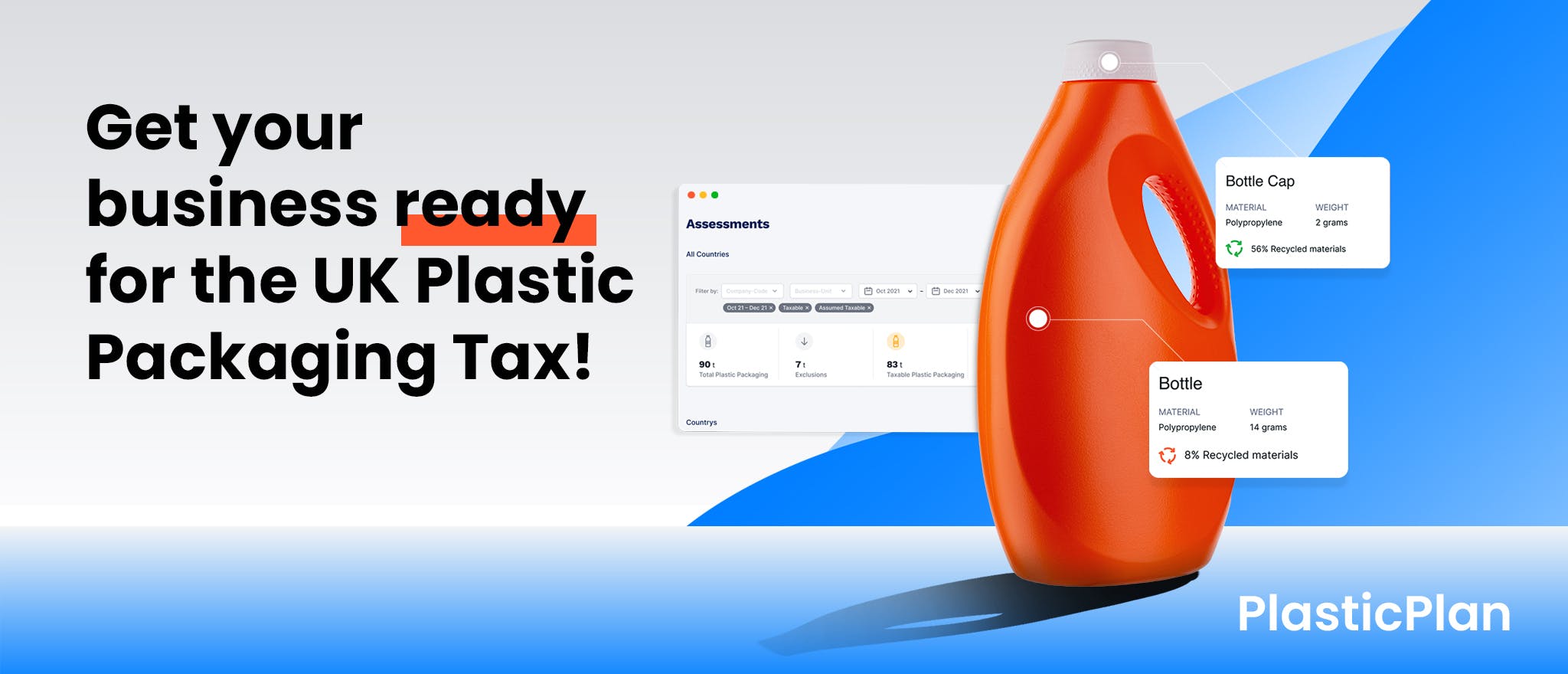PPT – Parts Per Trillion, Processing Program Table, PowerPoint, or Plastic Packaging Tax?
If you instinctively know, what these three letters stand for and it might affect the way you work, this is the read for you.
From April 1, 2022, a new tax will be introduced on plastic packaging made or imported into the U.K. that does not contain at least 30 percent recycled plastic. The tax rate will be 200 pounds per ton of plastic packaging.
- The implementation of a new tax
- Regulations that could affect your company
- Exemptions you should know about
The Plastic Packaging Tax (PPT) is one of the measures governments are taking to address the threats of climate change. By the United Nations Paris Climate Agreement, on December 12, 2020, the United Kingdom committed to reducing greenhouse gas emissions by at least 68 percent by 2030 compared to 1990 levels. To achieve this goal, the Finance Act 2021 has decided to establish a more sustainable and environmentally friendly tax system. One step is the implementation of a new tax on plastic packaging.
The new tax on plastic packaging with less than 30 percent recycled plastic was already announced for the 2018 budget. The government launched a consultation in February 2019 to get input on the initial proposals for the design of the tax.
As part of the Finance Act published on March 11, 2021, the U.K. government now has approved a tax on plastic packaging to be levied from April 2022. Her Majesty's Revenue and Customs (HMRC) has published information on guidance and regulations and the application of the new plastic tax.
The key facts of PPT
The introduction of PPT challenges UK companies to keep a closer eye on their plastic packaging supply chain and to familiarize themselves with the new requirements if the packaging is subject to tax. Companies must register for the plastic tax if they manufacture or import 10 or more tons of plastic packaging domestically in a 12-month period. Another criterion for taxing their packaging is that the plastic packaging contains less than 30 percent recycled plastic. The tax rate is 200 pounds per ton for packaging without a recycled content of at least 30 percent.
PPT’s scope of application
The tax applies to all plastic packaging produced in or imported into the United Kingdom unless it is covered by the exemptions. This applies to both filled and unfilled packaging.
Plastic packaging is defined according to the following characteristics:
- Plastic is the largest component of the packaging
- Even if the packaging is made of bioplastics or compostable and oxo-degradable plastics
- The packaging is intended for the storage, protection, handling, delivery, or presentation of goods, at any stage of the supply chain. Examples include prepared food trays, yogurt pots, labels, boxes, crates, etc.
- Disposable packaging, such as plastic bags, garbage bags, and disposable plastic cups of all types, are counted as plastic packaging
Non-taxable exceptions
Unless plastic packaging is not considered a packaging component in the sense of the law, it is not subject to the PPT. Therefore, they do not fall under the 10-tonne threshold. Examples are:
- Products where the packing function is subordinate to the warehouse function, such as toolboxes, first aid kits, headphone and earbuds cases, manicure sets, eyeglass cases, video game cases, or board game boxes
- Products for which the packaging is an essential part of the goods, e.g., water filter cartridges, printer, and toner cartridges, inhalers, tea bags, perforated rice bags, lighters, or dental floss containers
- Products that are reused to present merchandise to consumers, as well as products that are permanently intended for this purpose before or immediately after their manufacture or importation. Examples are sales shelves, store fittings, or presentation stands
The exemptions listed below also do not incur tax, but 3. and 4. must be included in the calculation of the 10-ton threshold:
- Plastic transport packaging for imported goods, such as shrink-wrap packaging on pallets
- Plastic packaging used in aircraft, ship, and railroad freight warehouses (once removed from warehouses and imported, the exemption does not apply)
- Plastic packaging manufactured or imported as the immediate packaging of a medical product
- Components permanently intended or designed for a use other than packaging
Registration for the plastic packaging tax will begin on April 1, 2022, as HMRC announced. Businesses are subject to the tax and must register as soon as they manufacture or import more than 10 tons of taxable plastic packaging in 12 months. The 12 months is to be considered one continuous period, not a calendar year. Packaging manufactured or imported before April 1, 2022, is not taxable.
What does this mean for businesses?
****April 2022 is closer than it seems. To be fully prepared, businesses should start collecting packaging data now. It is not easy to stay on top of the requirements and understand which data must be collected, how to classify your packaging products, and what to report.
We at PlasticPlan are happy to support you. Get in touch with us.

